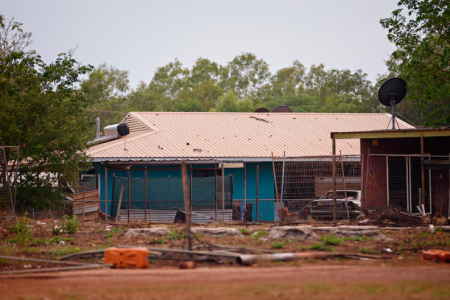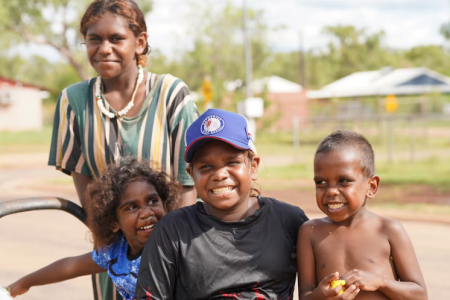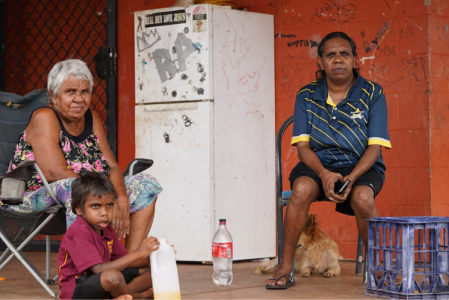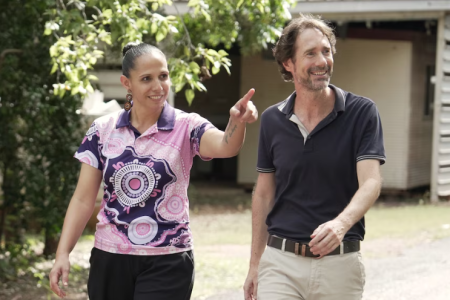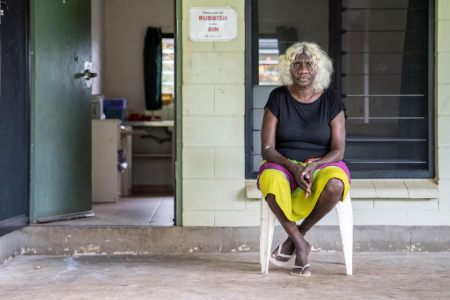How the NT's housing crisis is forcing sick and elderly people into a cycle of homelessness
By
ABC News
- Replies 2
Each year, many residents from remote communities across the Northern Territory head to Darwin in search of safety, services and space.
Often it's to access healthcare, but it can also be to escape overcrowded homes or issues arising from alcohol use.
But once people arrive in the city, they can become trapped in a cycle of temporary accommodation and homelessness.
Government data shows a wait time for priority applicants in social housing of up to eight years for a one-bedroom unit in Darwin, or six years for a three-bedroom home.
In more remote parts of the territory such as Nhulunbuy, Tennant Creek and Alice Springs, wait times are closer to a decade.
Remote communities struggling with alcohol and overcrowding
In Katherine, government data indicates just 3 per cent of applicants were allocated public housing in 2024.
In Binjari — a small Aboriginal community about 16 kilometres west of Katherine — mother-of-five Stella Raymond has been waiting since 2018 for a bigger home.
Seven people share her two-bedroom flat, including her five children aged between 21 and two.
Extended family also often stay when visiting town.
"It's a lot, it's crowded, and we need a bigger house," she said.
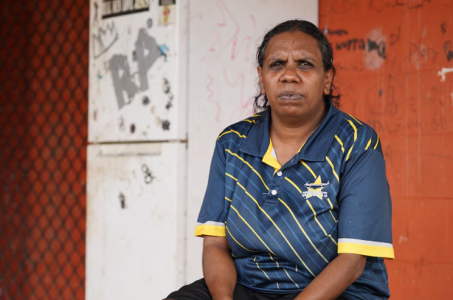
Ms Raymond grew up in Binjari and said life in the community had become worse.
"Housing and alcohol, those are the big issues here," she said.
"The kids see people come in with alcohol... we never saw that when we were kids."
In the last two years, the community’s pre-school shut and the local clinic has closed.
The community is also yet to see the benefits of a multi-billion-dollar housing commitment made over a year ago by the federal government.
Ms Raymond said she felt Binjari had been forgotten by government.
"They promise they'll do things for our community, but it doesn't happen," she said.
Darwin housing providers 'always full'
The strain of overcrowding, antisocial behaviour from alcohol use, and limited access to healthcare are among the factors pushing people from communities into Darwin.
But even in the city, a critical shortage of long-term housing options see many stuck in temporary accommodation.
CatholicCare NT's senior housing manager Steve Kopandy said the organisation's 180-bed hostel accommodation facility in Darwin was always full.
"Sadly, we have a lot more referrals than what we can handle. We're always full here, there's such a demand for it," he said.
Residents at the accommodation are often people from bush communities with complex health needs.
They can include dialysis and cancer patients, pregnant women, and people escaping unrest or domestic violence.
"There's a huge need for housing in remote Australia but people will always need to come to Darwin," Mr Kopandy said.
Michelle Martin travelled from Maningrida in Western Arnhem Land and has been at the facility since January.
Her sons and grandsons suffer from a rare brain disorder, and the family often travel from Maningrida for treatment.
"There's no hospital there, it's just a little community clinic," she said.
Ms Martin also has her own health challenges and needs to be close to doctors.
"I had a heart bypass operation last year so I'm looking for a house for myself too," she said.
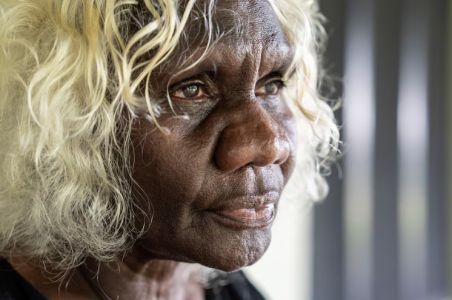
The 65-year-old has been on the waitlist for social housing in Darwin for five years, but her application has recently been put on hold until she is able to obtain a housing reference.
Marama Johnstone, who works with participants staying at the facility, said women and families are sometimes forced to return to violent or dangerous situations in community due to a lack of options in the city.
"With overcrowding in communities there's a lot of anti-social behaviour … and unfortunately because of the housing crisis here in Darwin people have had to go back to where all the trouble is," she said.
NT being 'left behind' in nationwide housing push
CatholicCare NT acquired a 5-hectare hostel site in 2022 with plans to build a further 44 new social housing residences and 10 transitional homes.
The site would include a health service and a training facility to help people develop the skills to take care of a home.
CatholicCare NT was hopeful the project would be funded under the Housing Australia Future Fund (HAFF).
But despite having support from the NT government and development application approval, the project was rejected.
"The NT does miss out... the issues here are complex and quite costly to solve," Mr Kopandy said.
The HAFF is a $10 billion federal government initiative to support 20,000 new social homes and 10,000 affordable homes across Australia over five years.
Of the 183 projects selected for funding under round one of the Housing Australia Future Fund, just five are from the NT.
Mr Kopandy admitted the $42.5 million project may not fit with the government's value-for-money criteria but said without Commonwealth support, much needed public housing projects would be unable to get off the ground.
"If Housing Australia is looking at quotas and ticking boxes, the territory is going to get left behind," he said.
Written by Olivana Lathouris, ABC News.
Often it's to access healthcare, but it can also be to escape overcrowded homes or issues arising from alcohol use.
But once people arrive in the city, they can become trapped in a cycle of temporary accommodation and homelessness.
Government data shows a wait time for priority applicants in social housing of up to eight years for a one-bedroom unit in Darwin, or six years for a three-bedroom home.
In more remote parts of the territory such as Nhulunbuy, Tennant Creek and Alice Springs, wait times are closer to a decade.
Remote communities struggling with alcohol and overcrowding
In Katherine, government data indicates just 3 per cent of applicants were allocated public housing in 2024.
In Binjari — a small Aboriginal community about 16 kilometres west of Katherine — mother-of-five Stella Raymond has been waiting since 2018 for a bigger home.
Seven people share her two-bedroom flat, including her five children aged between 21 and two.
Extended family also often stay when visiting town.
"It's a lot, it's crowded, and we need a bigger house," she said.

Stella Raymond says she's seen her community's quality of living deteriorate over the years. (ABC News: Pete Garnish)
"Housing and alcohol, those are the big issues here," she said.
"The kids see people come in with alcohol... we never saw that when we were kids."
In the last two years, the community’s pre-school shut and the local clinic has closed.
The community is also yet to see the benefits of a multi-billion-dollar housing commitment made over a year ago by the federal government.
Ms Raymond said she felt Binjari had been forgotten by government.
"They promise they'll do things for our community, but it doesn't happen," she said.
Darwin housing providers 'always full'
The strain of overcrowding, antisocial behaviour from alcohol use, and limited access to healthcare are among the factors pushing people from communities into Darwin.
But even in the city, a critical shortage of long-term housing options see many stuck in temporary accommodation.
CatholicCare NT's senior housing manager Steve Kopandy said the organisation's 180-bed hostel accommodation facility in Darwin was always full.
"Sadly, we have a lot more referrals than what we can handle. We're always full here, there's such a demand for it," he said.
Residents at the accommodation are often people from bush communities with complex health needs.
They can include dialysis and cancer patients, pregnant women, and people escaping unrest or domestic violence.
"There's a huge need for housing in remote Australia but people will always need to come to Darwin," Mr Kopandy said.
Michelle Martin travelled from Maningrida in Western Arnhem Land and has been at the facility since January.
Her sons and grandsons suffer from a rare brain disorder, and the family often travel from Maningrida for treatment.
"There's no hospital there, it's just a little community clinic," she said.
Ms Martin also has her own health challenges and needs to be close to doctors.
"I had a heart bypass operation last year so I'm looking for a house for myself too," she said.

Healthcare access saw Michelle move from her remote community to temporary accommodation in Darwin. (ABC News: Tristan Hooft)
Marama Johnstone, who works with participants staying at the facility, said women and families are sometimes forced to return to violent or dangerous situations in community due to a lack of options in the city.
"With overcrowding in communities there's a lot of anti-social behaviour … and unfortunately because of the housing crisis here in Darwin people have had to go back to where all the trouble is," she said.
NT being 'left behind' in nationwide housing push
CatholicCare NT acquired a 5-hectare hostel site in 2022 with plans to build a further 44 new social housing residences and 10 transitional homes.
The site would include a health service and a training facility to help people develop the skills to take care of a home.
CatholicCare NT was hopeful the project would be funded under the Housing Australia Future Fund (HAFF).
But despite having support from the NT government and development application approval, the project was rejected.
"The NT does miss out... the issues here are complex and quite costly to solve," Mr Kopandy said.
The HAFF is a $10 billion federal government initiative to support 20,000 new social homes and 10,000 affordable homes across Australia over five years.
Of the 183 projects selected for funding under round one of the Housing Australia Future Fund, just five are from the NT.
Mr Kopandy admitted the $42.5 million project may not fit with the government's value-for-money criteria but said without Commonwealth support, much needed public housing projects would be unable to get off the ground.
"If Housing Australia is looking at quotas and ticking boxes, the territory is going to get left behind," he said.
Written by Olivana Lathouris, ABC News.

